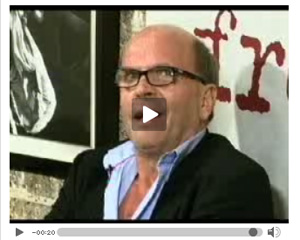One of the more influential figures in British journalism – Alan Rusbridger the editor-in-chief of the Guardian and the Observer discussed his ‘why journalism matters’ at a star studded Media Standards Trust event at the British Academy last night. His audience included Lord Puttnam, Robert Peston, Roger Graef, Bill Hagerty, Felicity Green and Nick Cohen.
In his tour d’horizon Rusbridger chose to refer back to the past and, most importantly, forward to the future. He traced the origins of the recent seminal reporting on the G20 protests by Paul Lewis – which lead to a furore over the death of an innocent bystander Ian Tomlinson, after a phone video came to light. It was reportage taking the Guardian back to its foundations, Rusbridger said, drawing comparisons with its reporting of the Peterloo riots in Manchester in 1819.
That and Lewis’ work was based on simple journalistic principles of observing, digging for the truth and not giving up. “It was a piece of conventional reporting and tapping into the resources of a crowd,” he said. “There are thousands of reporters in any crowd nowadays. There was nothing to stop people from publishing those pictures but it needed the apparatus of a mainstream news organisation for that to cut through and have impact.”
Likewise on investigations. The money and time the Guardian had invested in the major series on tax avoidance earlier this year was, initially, simply the traditional way investigations were done. That story had been transformed by documents which came from readers of the series and were put first on the net before being injuncted by Barclays Bank. His audience had a sneak glimpse of them up on the screen.
But the days of journalists behind castle walls sending out articles ‘like mortars-some hit, some missed’ to readers were now gone. The process was thanks to the internet firmly a two-way one.
He quoted Jemina Kiss, the Guardian technology reporter, who has over 13,000 personal followers on Twitter and uses them to help research, shape and comment on her stories. Rusbridger admitted to being an initial Twitter sceptic, before his conversion: ‘I didn’t get it’. “Sometimes you are too old to keep up with all these things and Twitter just seemed silly and I didn’t have time to add it to all of these other things – but that was completely wrong.”
The Guardian editor looked back – all of 30 years – to the days of long and dull parliamentary reports in the broadsheet British press and compared them to the likes of EveryBlock on the internet, the US-based site which aggregates information in micro-areas to help plan journeys to work, and to avoid crime and other hazards. He’s not sure if it’s journalism, but ‘does it matter?’
Local struggles
But it was on the death of local news – on TV and in newspapers – that he was at his most challenging. ITV had all but retreated from the provision of it, with a final surrender due next year; local papers were feeling the economic heat severely and cutting back on the essential reporting of council, council committees and the courts – to the dismay of some judges. He called it the ‘collapse of the structure of political reporting’.
This ‘public information journalism’ should not be allowed to disappear, he said. It needed public subsidy. Rusbridger posited that it could be, but would not be, done by the BBC. More hopeful were the trials currently being run by the Press Association where they would act as a print and video agency / aggregrator for the country and syndicate those services to local papers/websites.
“This bit of journalism is going to have to be done by somebody,” Rusbridger said. “It makes me worry about all of those public authorities and courts which will in future operate without any kind of systematic public scrutiny. I don’t think our legislators have begun to wake up to this imminent problem as we face the collapse of the infrastructure of local news in the press and broadcasting.”
Rusbridger said local public service journalism was a ‘kind of utility’ which was just as important as gas and water. “We must face up to the fact that if there is no public subsidy, then some of this [public service] reporting will come to pass in this country,” he said. “The need is there [for subsidy]. It is going to be needed pretty quickly.”
Whilst modern journalism was evolving and being transformed by the new media, it still firmly mattered as did journalists, he said. “There are many things that mainstream media do, which in collaboration with others is still really important. The ability to take a large audience and amplify things and to give more weight to what would [otherwise] be fragments. Somebody has to have the job of pulling it all together.” All was not gloomy in Rusbridger’s digital crystal ball.
More to follow from Journalism.co.uk. The event was tweeted live via @journalism_live.
John Mair is a senior lecturer in broadcasting at Coventry University. He is currently editing a special issue of the journal ‘Ethical Space’ on the reporting of the Great Crash of ’08. He will run a world-wide video conference, supported by Journalism.co.uk, on ‘Is World Journalism in Crisis?’ in Coventry on October 28.
